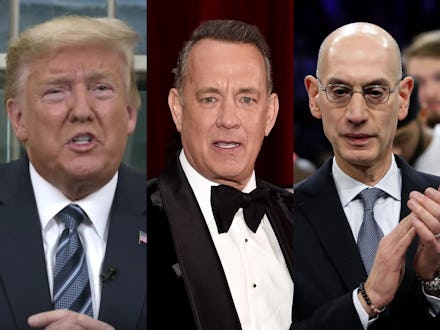In one wild hour, the U.S.'s coronavirus problem became very real

It's a strange feeling, watching reality slide sideways and knowing that you're living through an inflection point in history — the sort of moment that will divide everything that happens next from all that's come before. And for an hour on Wednesday night, people across the country were subjected to that eerie sense of skewed existence, as the the coronavirus pandemic forced its way onto our television screens and Twitter feeds with a new and terrifying urgency.
For most people, it started with President Trump's rather breathy attempt to calm a jittery nation with an Oval Office speech, reportedly penned by his son-in-law Jared Kushner, who is not a scientist but whose personal research is reportedly dictating Trump's response to the crisis, and Trump's aggressively anti-immigration senior policy adviser Stephen Miller. The only problem was the roughly 11-minute address managed to bungle three key facts, while doing nothing to actually acknowledge America's unpreparedness for the ongoing viral crisis.
Over the course of his address, an audibly "laboring" Trump, as The Washington Post described him, urged calm, while announcing a 30-day travel ban on people traveling from the European Union, as well as a hold on shipping and cargo.
"We will be suspending all travel from Europe to the United States for the next 30 days," the president declared, adding that "there will be exemptions for Americans who have undergone appropriate screenings. And these prohibitions will not only apply to the tremendous amount of trade and cargo, but various other things as we get approval."
Viewers — perhaps addled by the image of former vice presidential nominee Sarah Palin rapping "Baby Got Back" that, unbelievably, immediately preceded Trump's speech — could be forgiven for assuming the worst about Trump's apparently nativist plan.
The problem, it turns out, was that he was 100% wrong in how he described it. As it happens, the new government rules expressly do not include trade and cargo, the travel ban only applies to portions of the EU, and it doesn't actually affect American citizens, green card holders, or people with family in the U.S.
In other words: Trump bungled virtually every detail about the plan he was announcing to the country via a prewritten speech that he was reading from a teleprompter.
The hits kept coming, with Trump also telling the public that insurance companies "have agreed to waive all copayments for coronavirus treatments" — news that came as a shock to the insurance lobbying firm AHIP, which told Politico that the agreed upon waiver was strictly "for testing. Not for treatment."
For his part, the president didn't seem all that thrilled with his own performance Wednesday, ending his speech with an exhausted-sounding "okaaaaaaaay" the moment the cameras stopped rolling.
Glaring mistakes aside, the president's speech was notable not only for what he did say, but also what he didn't — specifically, he didn't mention the catastrophic lack of available testing for coronavirus, nor did he address how the travel ban would help stem the tide of the growing viral outbreak already taking place within the United States itself. The president also failed to mention that he'd neglected to warn the European Union of his travel ban before announcing it to the American public — much to the bewildered consternation of European officials, who blasted the plan Thursday morning as being imposed "unilaterally and without consultation."
Still, the president's absolute failure to calm a nervous nation was useful in the sense that it both raised the profile of the coronavirus pandemic, and highlighted just how woefully unprepared the government has been in addressing the outbreak. In fact, if people were looking for the sort of decisive leadership they'd expect from the president of the United States during a moment of crisis, they could probably instead turn to NBA commissioner Adam Silver, who immediately suspended the remaining basketball season at almost the exact same time as Trump was trying to convince the public that all was well, after a Utah Jazz player tested positive for the virus.
If a bungled presidential address doesn't get the public's attention, canceling an entire season of basketball probably will. And while the president's decision to close off the country will likely have serious economic consequences, Dallas Mavericks owner Mark Cuban took the admirable step of pledging to help his hourly employees who would be most hurt by the NBA's decision to suspend games.
Wednesday night's cavalcade of horrors wasn't over yet, though. Because at roughly the same time as both Trump's speech and Silver's NBA decision, actor Tom Hanks announced that both he and wife Rita Wilson had — yup — tested positive for coronavirus.
Hanks's inexplicably shirtless son Chet later confirmed his father's diagnosis.
The irony of Hanks's announcement is that had he been in the United States, and not Australia, it's entirely possible he wouldn't have been able to be tested for the virus in the first place.
Still, the fact that this all took place over the course of roughly a single hour is a testament to how quickly the coronavirus pandemic has made itself an inescapable facet of our daily lives, as well as a wake-up call to just how ill prepared the institutions we typically turn to for stability and order are to address this crisis. Already we've seen bedlam across college campuses and in airports struggling to keep pace with the accelerating severity of the disease's spread. Perhaps Wednesday night's compound news blitz will ultimately be seen as a good thing: a wake-up call for a complicit public, from celebrity gossip-mongers to sports fans, to start taking the pandemic seriously.